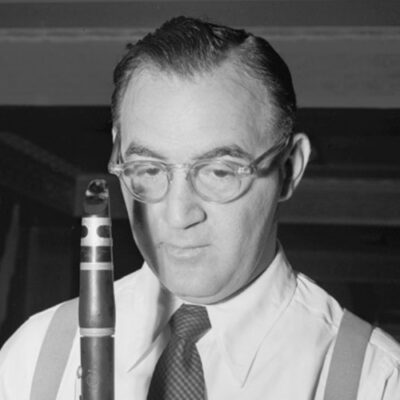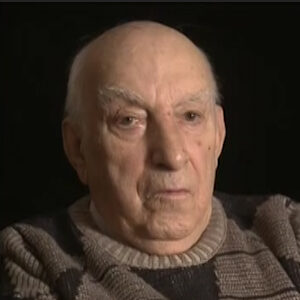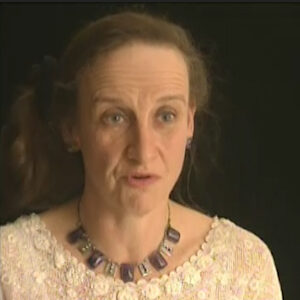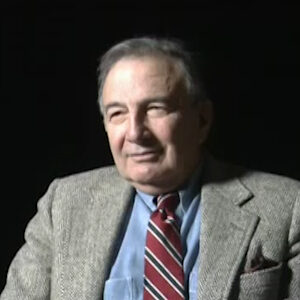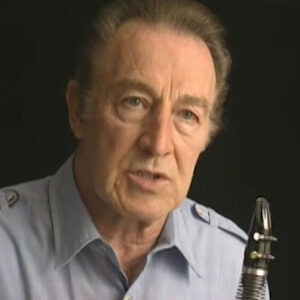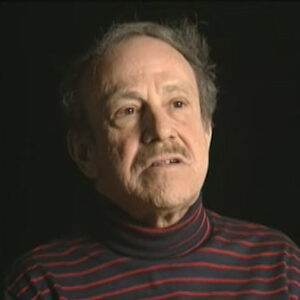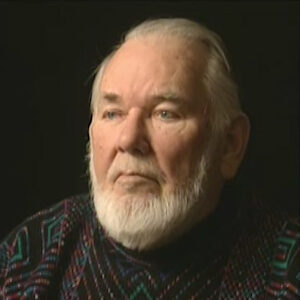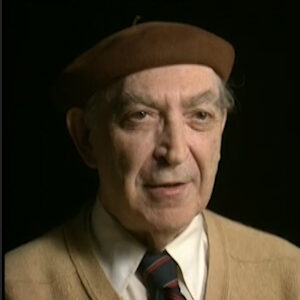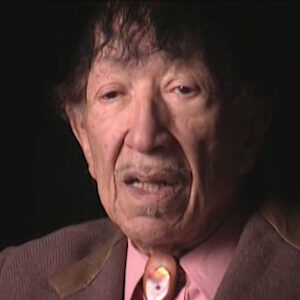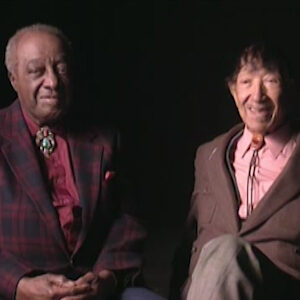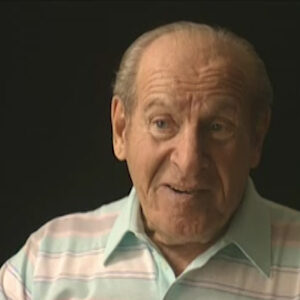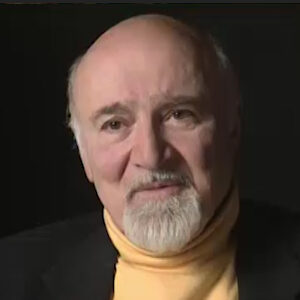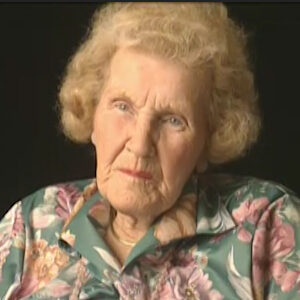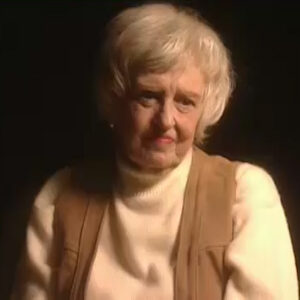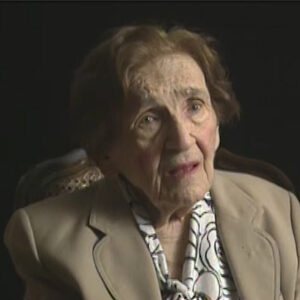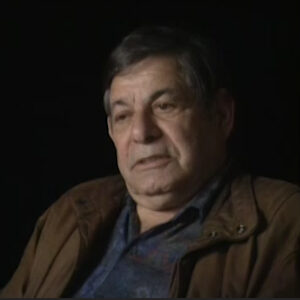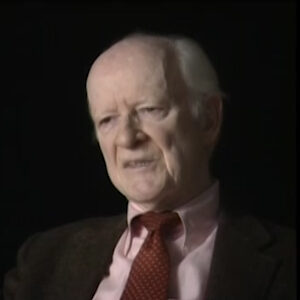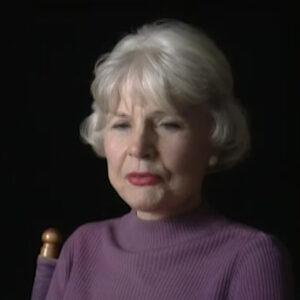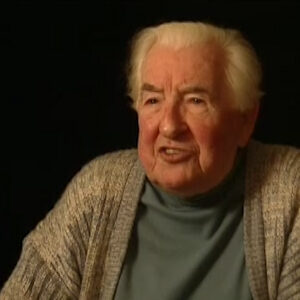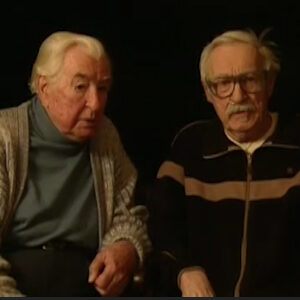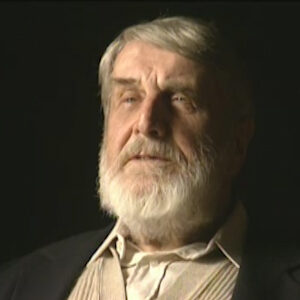Speaker So then let’s say you write the same story again. OK. Maybe three.
Speaker Oh, yes. Well, you were mentioning about the setup time required for TV and the problems you have. Well, same thing really obtains in the recording field, too. In the case of Benny, set up one night at the 30th Street studio and for his new band, the one that does recorded in February and March 53 with Helen singing the band he was going to take on the road with him. And the problem, the way the setup was made, was made long before Benny got there and the band came and they started rehearsing Sandrock even just Benny walking Sakinah Bass and which is very important to him. He had an anchor for him, bass. So he said, well, I’ll fix it. So scribed roundest that moved all the chairs and moved everybody over. So they’re blowing out of a corner, which nice sound anyway. And it breaks up the pattern sustaining patterns in a room, big room like that. So I checked with them after the first rundown. And Benny, can you hear the bass? Yeah, I can hear it now, but I don’t want to hit like the bass player.
Speaker Now, I would say a bass player is named. But that’s what he was objecting to simply. So there’s not much of a gulf between records and TV.
Speaker No. Let’s go back to when you first met me. What was the first time you heard Benny and got interested in his music?
Speaker Oh, sure. And the first time I really heard him was on some records. He had made in 1928, not under his name, of course, but I was a jazz hound in a way. And I found a very, really exciting to listen to him. And later on, when he did form a band, first thing I knew about him was the records that were issued on Columbia. These are the early ones. Helen sang three or four, maybe five different selections. And Benny had a kind of a pickup band, really, but he had some prominent people in it, too. Looking forward to the day when he got his own band into a place. That’s when I first met him. I wasn’t working for Columbia at that time, but I found out they were rehearsing here and there weren’t around and just hung there backstage, so to speak, and ran to Gene. His younger brother, Gene, I become kind of casual buddies, so I’d get the word when they were going gonna rehearse. So I go around, listen, and that was all fine. Eventually, I got to meet Benny. Hello. You know, it’s looking often. It can hurt somebody else, shake their hand. Nice to meet you. He went on his way afterward to get used to me because I kept coming around. As I explained Gilliver records to him, these are airchecks that he’d order from time to time work.
Speaker Oh, yeah. Well, he’d be performing on the radio.
Speaker Yes. Generally, whenever he went into a new place, he would. Order a batch of airchecks just just to see how that room sounded. Some rooms sound funny. One thing you notice right away in the smaller rooms, cropper’s foot on a bass drum and really dominates everything. So he’s conscious of those things. And you want to see how the sound. From judging from the checks, he just reshuffle them, you know, move them back forward. Left. Right. Something like that. So usually our airchecks about every three weeks or so. And. I happen to be using one of these studios, make piano recordings of myself. I take care of recordings around him like an audition tape is done nowadays and leave it. Thank you, Y.A.. All these people each got one. None the less. I got to deliver the records because I said I can take them down for you. You don’t have to hire a messenger. So that’s fine, because then I could hear them while they’re rehearsing down wherever the hell playing Hotel Roosevelt that time. Then later on in Pennsylvania and so forth and. That’s where I really got to meet him. He got used to seeing me around and he understood I knew something about electronics and led to other things.
Speaker Then the the the next really close association I know is I happened quite a bit later over the Carnegie Hall record. And when that when you were first called in about that. But is there any other stories in the intervening time between you when you first got to know me, know their checks and and that quote we talked about yesterday?
Speaker Fill me in.
Speaker I know. I guess the story that you read him was that you were working at Columbia.
Speaker Yes, he was he involved in that, you know, working here with that coincidental thing that you happened because you were hanging around?
Speaker You know, I was working there then and this was in the Chicago studio. And Peggy showed up at Benny’s request. And also John Hammond showed up, not necessarily at the request. Sorry, John, but she was nervous, understandably. And the studio was small, friendly, you know, nice warm studio 012 in the Wrigley building. It’s gone now. The studio, not the Reagan Building. Right. She was having problems with the thing, trying to get her style into the thing. She’d been singing with the pianist. That’s about all for a long time. Before that, the only band singing she did was with a country band and the national barn dance. Things like that. Right. Things making a valiant effort. And then he was very patient. He got in the control room, listened all playbacks. He listened while he was out there and he encouraged Mel to how to, you know, give us some friendly notes once in a while. Everything is fine, except John Hammond was trying to sell another vocalist. And many just wasn’t interested. He was this girl was there. They’re working. Let’s keep going. The tuneless Elmers tune. And I did. And I’m quite sure of the number. Runs through 16 takes. Before they got one that many lacked in the meantime, there was a family feud going on between John half and Benny over John. Well, he’s being a bit more insistent than he should have under the circumstances. Peggy could see what was going on. So planned to get enough of that. He stood up. He’s sitting on a chair, just came back chair of own restaurant type Jerry pickup fraud. Cha said John oh, flustered. Ran out in the hall. Ran out of control room. Ran the studio home.
Speaker I was just coming back in and.
Speaker I understood what had happened. He’d been told to leave. I thought would more than Tallboys product, so to speak.
Speaker I guess with or Peggy told me, they said she was shaking so much. I think Mel compared it to to a forest fire or something. Noise. It was making light.
Speaker Yeah. I you remember. Can you describe that. Yeah. Well that’s true. No extraneous noises that go along with rustling of paper unmistakably there. But they cured that. It took the like turn round backwards, you know, directional mike and had her with a paper on the other side of the mike, the dead side. And she was on the right side. So actually embracing the microphone back then. Sixteen tapes later. And there she was. She was on her way and certainly made some hit records. No doubt about that. I don’t know what John, if John ever changes opinion or not, but John. Too early fault in that to get much sympathy from anybody else. He said and later he said. What does one do, Bill? Does one fight? You ever got in a fight and saw blood, you’d think go home again?
Speaker You also you look in the fight and saying what you said about Peggy and his accent, that. Oh, um, she can’t. She can’t sing or she can’t. She did so well.
Speaker Both he and his sister, Alice and I have a talking through clenched teeth, and I guess it sounds very English, but John isn’t English and neither was Alice. But Alice, of course, lived there for some time. And he chose to turn this number of once in a while, and it was astonishing. A lot of people just stopped talking because he had mannerisms. He put it up.
Speaker Tell me more about recording experiences with Benny. Is there any other stick in your mind? Again, leading up to the party. All right. You were what he was like.
Speaker Well, I mean, a lot of discussion about the half a year or more that he spent changing his obituary. And during that time, I was fairly closely associated with him on another project entirely. And he kept working at this thing with reginal kill and very seriously. They were not kidding. You know, like his daily routine was clarinet all day long and break for lunch and more clarinet. So later on, we’re talking about that in connection with something else entirely about the premiere of a composition he had, which had been written at his commission from Paul Hindemith. And he wanted to get the first performance, public performance, of course. So he was wailing away at this thing for a public performance. And eventually this came to pass. He’d done New York Philharmonic with the Leonard Bernstein and Benny. And shortly after that, he started drifting back into this band scene. So he practicing at home. He wasn’t practicing Hindemith anymore, practicing sweet Georgia Brown, not by the same composer. And he began to notice. You can’t really shift back and forth like you shift gears on this ambushers.
Speaker Double lip thing, as opposed to the normal armature where you got a firm grip on the upper edge of the mouthpiece. Cause you still have the lip curled over the teeth for the reed side of the mouthpiece. And he said, you know, you can’t do this. I didn’t realize it. So he was still in the throes of some of that stuff when they started this tour where he finally decided he’d want to play anymore. And I broke up the tour. They didn’t really break it up. They started to wear. Benny went home. Tour went on.
Speaker But that sandwich was something that’s later. That was 53. Right. So let’s go back to when he discovered or Rachel discovered. Rachel discovered in her closet.
Speaker These old tape discs you first heard about Beechy before. Tape. Yes, Rachel. The whole interview. I’m just trying again to see Rachel. Mm hmm. OK. When the tapes finally were opened and turned out to be disks, then Benny said these things have been hanging or hunt for so damn long. I’m going to play one and see what they’re like.
Speaker So I started play them as a cheater. Pretty good. Wait. Finally got to some favorite passages here and there and discs. And he was playing them, playing in the same one over and over again. I said these things are only acetate like I showed you before. Which is like a lacquer and it wears it’s not impervious at all. And eventually it better ask somebody about this. And he called me and said, hey, get those things on tape right away and play the tapes and stuff all around the desk, because if you want to use them, you may not be able to if you get them to hacked up with scratches and noise. So I did. Okay. And he had them put on tape. Bob Fine Renaults guy had studio there in 57 Street. He transferred them a little 70s real and that’s all. Then he could play and they didn’t have a big tape machine. He didn’t like those things anyway for a very good reason. He’d managed to break anything, came anywhere near the well. So he did. Take the tape that had been made. Played it, told himself that he really had something there. And then he got in touch with Columbia Records. It was Columbia Records Inc., then several changes of names. But Ted Wallerstein, who had been with Victor for many years and had been he had him at Victor. He was now president of Columbia. And Ted Audition Tapes and Prall called in several people, his.
Speaker Head of A and R for masterworks. This is why Ted Weller stands only in the most important part of the recording industry was, you know, serious music masterworks. So Clark percent listening isn’t gutted gutter would you know. Very polite guy and knowledgeable, but you could tell he was listening to the dance band.
Speaker So eventually they made an arrangement so that. Columbia, which rerecord everything he had and issue it as a masterwork item. They didn’t come up with a popular department or Columbia Masterworks.
Speaker Carnegie Hall, thank you, described him yesterday. He showed up at the Columbia Records one day and stopped in your office. I’m going up to see the president of the company. Stick around. Tell me. Tell that story you told me yesterday that you sort of found out about it happening.
Speaker Yeah. He didn’t really tell me what you’re going to start again.
Speaker My question will be, is. Clear no one there. I got a call. All right.
Speaker Well, it came to pass when he showed up one day on his way in to see Ted Wallerstein, of course. And he went by the lab I had there. Hey, stick around. I’ll see you in about an hour or so. So came back down to explain what had taking place. He said, I asked Ted if you could work on the records. Oh, sure. Wonderful. He gave me the whole box. The tin box. That damn box is equal. And we’d start to work on it and ran in all kinds of problems, of course, which in the end we did the best we could and put this way.
Speaker When you were working. What was in the box and what you had to do. I mean, in. So what went into it? When you open this box where you find you have to do it, get.
Speaker Yes, well, the main problem with the contents of the box was that there were all 12 inch, 78 R.P.M. disks that had been recorded.
Speaker Al fresco buddy at the time is now. So it means the guy’s recording me away. Are on turntable A, you got turntable B, all set up. But he hasn’t turned it on yet. And he gets down near the label area and a very inside of the disk on turntable A.. And he’s got a switch madly over. It turns they will be done. That isn’t in the middle of a phrase or word held note anything that’s got to go. That’s it. Now if that’s how you wind up trying to splice all this stuff and it can be done. In fact, it’s no big deal to do that except the second Benny had the disks made on turntable eight, for example.
Speaker The pitch was quite accurate. They play Honeysuckle Rose and Affan like itself. It’s a very close. They’re so close, that is. And later on, halfway through, Honeysuckle Rose, not even halfway through, they switched the turntable. It is no longer an F. It’s somewhere between F and the crack just above E, which is a taffin since. So we had to rig up turntables. One of them to run with an oscillator so we could get the speed of their turntable exactly where it was supposed to be to match. Well, every other record which made on a different turntable. So that held up things for a while. You know, you need a. Two hundred watt amplifier to drive a motor on a transcription turntable and arrogant. All this thing got gun running. Other problems again due to the fact that Benny kept playing these things before he got them on tape.
Speaker We couldn’t use the tape that he furnished. It was to go to casual. I’ll get through this thing. We had a drop one number completely from one of the Oncor numbers had to be taken out completely. The other. Problem was when they had a bass solo, Bass was standing at some nominal place back with a rhythm section. But you couldn’t hear him. The microphones too far away. So bass solos had to be removed.
Speaker Things of that nature kept recurring memory, especially my justices’ solos, because that became such a famous landmark. I can’t say anything about that. No.
Speaker Oh, I noticed the solo. In fact, all the solos, especially the quartet trio thing. But just a solo. The thing that impressed me was the way he kept fooling around with the thing. And in the telling of the story, just held it. It says he was surprised that Benny pointed at him to take a solo. To begin with. So Jess himself says, well, I use a little bit of divorcee and McDowell now, McDowall is a composer. A lot of people have we wouldn’t know today, but nevertheless, I enjoyed it as it was going by and never occurred to me that, you know, somebody’s writing notes about this song should know about these things. It turns out Irving Collodion wrote the notes and a wonderful guy and very knowledgeable about music in general, particularly serious music. But he didn’t talk about things like that at all. And the album notes, so it went unnoticed until jazz people picked it up and they became a legend.
Speaker On and on, this is just a rumor that somebody told me that Harry James is solo was missing the part of one part of one solo.
Speaker Is that just a false phony? That there was part of one song or some song you took, it didn’t. There was some of it.
Speaker Now, I don’t know what that would be referring to. Did you lose any triggers and he was that second non core with. It wasn’t as if you had lost.
Speaker Now, the second one car that they lost was not really any show. Helen, we’re recording Helen. We’re trying to record.
Speaker You don’t talk with. We’ll unplug you like we did the phone go back to.
Speaker Yeah, the as far as I know, the musical worth of the one Oncor I had to remove was not that great. In fact, one of the other Oncor, the other Oncor Big John Special wasn’t a great. Guys retired then. Temple was too slow. Well, that’s where it wound up, however.
Speaker Can you tell me straight? I guess you would not be involved with the original recordings being made. Did you also in the process of doing this rerecording authority that was also the original?
Speaker Yes, because as you know from John Hammond’s recounting, he obviously thought that recording had made been made right there by someone in Carnegie Hall itself in the residential side. And there was a fellow there named Zeke Frank. His name was Lemuel. But that wasn’t a very big name for New York. So I became sick. Anyway, Zeke Frank had a little studio up there. An artist can then drive Radloff anything. Piano, vocal, whatever. And it’s possible that he could get a line down into Carnegie himself. I don’t know if that was ever done, but John assume that’s how the recordings came to be. They weren’t at all. The recordings were ordered by Albert Marx, who had the precedence to do this. He called someone he knew in the business and the acetate recording business volume. Harry Smith, who had artists recording studios A R. S two West forty six feet, something like that. And he said, Hey, do this though. And it was coming up and plenty of time. Two or three days ahead of time, according to Albert. So Larry Smith went over there and he got hold of one of the stagehands. Now here it gets a little difficult. The stagehands worked for the International Alliance of Theatrical Stage Employees. Yahtzee. Okay. They’re not allowed to touch sound equipment. The sound equipment just touched only by the IBEW, the International Brotherhood of Electrical Workers. However, you can lay a ten dollar bill on a stagehand and he’ll throw a switch on for you or he’ll turn a couple of knobs to something, wiggles on a meters and they’ll walk away, leave it on. And then it goes over to CBS Magic Control because they were broadcasting quite enough wild stuff from there and had this little console and a setup microphone slung from the rafters and a couple other microphones around casually showing up whenever master control. And then Mr. Smith called Master Control and said, hey, give me a feed from Carnegie to on my line. So sure got patches in what it was coming out of the Carnegie Hall line and plugs it into a US line. So then that was all set, going to work fine, except that Harry Smith only had two turntables and he had orders for two copies, at least two. So he laid off one set on another person, also in the same business, Universal Recording Studios, which is run by Raymond Scott. And sure enough, they recorded one set in Harry Smith recorded the other. Now, the one that was given to Benny was recorded by Raymond Scott’s little group. And it has their universal label on it and so forth. It’s a. Probably equal. Sound wise to the one that Albert Marx kept from so his early album never did. There was a big push on and Albert was asked, could he furnish his set of the records so that they could get the best quality and redo the whole Carnegie thing with modern equipment. But Albert, unfortunately, couldn’t find them.
Speaker Never did discover what happened to them. And what was the original story he’d never seen done yet. But Albert originally done the records as a gift for Helen.
Speaker Yes, well, that was the way it was.
Speaker My question will be put it three or whatever.
Speaker And of course, Albert’s original intent was to give a set of these to Helen as a present. However, it didn’t work out. Helen never got upset. My guess Bennie got her said.
Speaker OK, let’s talk about bangs back.
Speaker You know, you were aware Siegmund Studio was a. You probably know this from the public doesn’t know about. Where were you? How are you want to tell it?
Speaker Well, there are ways you could tell it wasn’t. His back was bothering him.
Speaker Whatever he was doing, he just stop and stare. And you can talk to him. And he’d nod and I wouldn’t say very much. And he wasn’t, you know, abrupt or implied or anything, but he just no conversation to speak of. Now, the other thing that you notice from time to time, he’d stretch out flat on something, almost anything, no matter where it happened to be on time. Helen, I visited him in the green room over at Wolf Trap, and his back was boring. And so I curled up in the fetal position with his feet on a cocktail table. And that is standard. This foot back was getting to him and other times a while after the 1978 kind of thing. Everyone went back to the penthouse above his apartment for a party, and then he headed right for the couch and just stretched out flat his back again. Now, there’s a wonderful quotation in a New Yorker interview that was conducted by Whitney Balliett with just Stacey and just describes how he happened to walk into Benny’s dressing room when I just before they supposed to go on it said that he was only half dressed and he saw this huge contraption that Benny had to wear braces part as just said, part whalebone looks like steel, probably aluminum, but just akitas, you know, from irritating him so much when he was performing. No, I never saw that. But I saw enough of the. Presence of backache.
Speaker To get used to complaining about this. Was 30, I guess. Now, why do you have the operation?
Speaker I never heard him complain about it all. Other people have mentioned the same thing. Didn’t seem to want to talk about it at all.
Speaker But you remember the first time you met John and in the in the book, I think you you described her being so protective, curious.
Speaker I remember noticing them together.
Speaker Mm hmm. Yeah. She was very aware of some of the things that bothered many. A more recent one than when I might have mentioned before was that when they were recording out at Wolf Trap. This was done strictly for, I think, PBS and it exists somewhere. WAGA had it. They insisted on using a multitude of microphones, which always bugged Benny.
Speaker You know, what got to him was he thought there should be one central microphone where he would operate and then maybe something for a vocalist that was about it and they’d get into scraps and he’d make them move the microphones or move completely ineffective. And Alice was the first to always explain to people why he said, in Bennett’s view, if they have two or three microphones, he could be halfway between one and start walking toward the one he thought to use, and that wouldn’t be the one they had on. And the confusion was great enough in a staged scene that he had perfect right to tell him what he wanted done with or without microphones. Now there are several. I don’t know if I.
Speaker She had some stories to tell about the aftermath of this tour. Barely off the ground. But I don’t think I should go into those because they they do talk about some people left. She was not bitter, but she was rather critical of some of the other people who are involved in that tour while away from management down to the performers. Some of the performers. But I don’t think we need them.
Speaker Let’s go back to before the war. The Carnegie Hall record was we got up to you were working on what happened. The story of how it came out and what it did for his career and went right into the next record, which was your brain.
Speaker OK, you’re rolling now. OK. Sorry. OK. So the. The follow on to the business of rerecording all of the discs of the Carnegie concert was that it was introduced and created quite a splash.
Speaker Sales wise, sold very well, and many went through some sort of a rejuvenation with all of this activity. But he didn’t have anything in mind about recreating his original big band, so to speak. He tried some things. Various bands that he got together on tour. Short ones, but mostly worked with smaller groups. Sextet was a favorite of his for a while. And then somewhat after that, he did a recording of the Coplin Clarinet Concerto with Aaron Copland himself conducting. And it was during the mastering and really the editing, I should say, of this, that I brought something else to his attention. Editing the Coplin was a problem because some of the material had been editing a Copan was a problem because some of the material had been musically altered. Probably Copeland got out one edition and changed his mind. Whatever. There are two sets of charts that the musicians call him and one I didn’t agree with the other one. When Benny had was the one he used in recording turned out to be not the one he really wanted to use in retrospect. So there’s a long afternoon of going through playback after playback of tapes and see if we can join up something, get around the corner and provide Benny with something that was satisfactory to him. No way. So finally, he is exasperated. Everybody is tired anyway. Hey, Benny, you wanna hear something good for a change? And he said, well, I. A novelty. Something like that. I shouldn’t turn my head, but I’m imitating him. That’s fine. Thank you. At any rate, I’d drag out some of these airchecks and NetWare I’d put a couple of Montaigne’s just put them on the same tape machine, took the Copeland off and put these on. I think it maybe because it was such a contrast that he just lit up with joy when he heard them explain what what they were there where you’ve gotten them out.
Speaker Right. Well, these are outtakes that I picked up and managed to hang onto. And how did I get into this? Well, all of these little studios in New York. Really, their main business was making airchecks of radio broadcasts of various artists. They also had little studio with a piano. Gwinn, their own song pluggers, used to use these studios. You don’t rush off of a ditty, so to speak.
Speaker And that was mainly their stock and trade airchecks. So I went in one of these places, make a recording on my own one day. Usual thing is piano solo stuff. So if I could pedal myself somewhere, I think I was working on radio station w i. N s Hearst Internet. Yeah. International News Service, I.A.. Right. Right. I made a recording that didn’t turn out so good. And I mentioned that I didn’t think the microphone was acting properly. So the guy on the studio said, you know, about microphones. I said, well, I know this one isn’t working. And so I offered to fix it. Is it? Look, I’ll fix the thing if you give me if you won’t charge me for that first record and make me a good one. Sure. Sure. So I fixed it and made a record. Fine. Paid him. And on the way out, he said, hey, did you do this on a regular basis, like come around once a month and check a microphone once a month? No, I’m sitting here listening to pros and talking about monthly maintenance equipment of this nature. OK. So I said, sure. And eventually it occurred to me that the guys doing the same thing, I’d guns circularize them, see if they’d like to buy my wares. Chernof, we’ve got a little circuit going on the shelf one place. All odd hours, of course, and you get in a place like that. The only thing new for tests. You have an oscillator. I’ll tell you quite a bit. But if you really want to check the whole system, you should check the radio tuner they used. You got to check the microphone in the studio by doing something. Whistle and count to ten backwards, whatever. So with the radio, you tune it in. Something of interest. And night after night, there was not a Benny. Artie Shaw. Duke Ellington.
Speaker Cab Calloway. On all playing from one hotel or another. And each of those hotels had what they called a wire telephone line ran in there. And I took up a little mixer, usually to position three position and have in half an hour broadcast. Usually the station itself would pay for it and the hotel for advantage. You know, I get a lot of publicity. And so since I had all his time at night, I got interested in some of the bands.
Speaker So I’d make tests, approach what they’re paying me for. So as you look around for a piece of material record on, well, one of these deaths are always a pile of rejects where someone had started to record something serious and whatever happened crashed. So that disk would be put aside. The other side of it was still perfectly usable. So on almost all of these airchecks this and I’ve got hundreds and hundreds of them, there is something on one side. It could be Joe Cooke, the comedian, or it could be that show written, his orchestra or whatever. And then on the other side, as Benny Goodman, Tommy Dorsey, Bob Crosby, Charlie Barnett, you name it. That’s how the collection was gathered.
Speaker And then keeping it in one place, that was another story entirely, but at any rate, the ones I had gathered up to the point where we’re playing Coplin Clarinet Concerto.
Speaker Were extensive enough to cover back into the 30s, at least till 35. I guess the first one I had it was 1935, in fact, is Helen singing from the hotel Roosevelt. Each little moment, John, when he heard this stuff that particular day and came very enthused about the idea. I then went on to broach the idea when we issue some of this stuff. So he went through the motions with his legal people. And they are a little cautious about this because. I believe it was Fred wearing. Some Fred had. Found that someone had recorded the program or two of his that had been broadcast and then had issued them as recordings without his knowledge, even let alone his permission, let alone paying them. So this was against the F of M rules. It was against the broadcast people’s rules and certainly didn’t fit well with Fred Wagner. So he his lawsuit kind of had a chilling effect on the trade. You know, big guns like RCA, Columbia, Decca and so forth. Very cautious about using our checks. So his lawyer said, look, we’ll take the responsibility for it if any lawsuits come up, because he felt that man felt that he could deal with the broadcast people. And the only thing left would be the sponsor. The sponsor would get his name into the thing somehow and be free publicity. So then he said, OK, we’ll do that. And they brought the thing into Ted Wallerstein, Columbia. And so his follow on for you to Carnegie played and made a tape for him, kind of a blockbuster thing. And sure enough, the idea sold. And the legal eagle at Columbia. Very nice man named Ken Raines, not Claude Ken. So Ken said, look, we got to cement this somehow so that we don’t get burned at all. They take all responsibility. But so they worked out that stuff off. And running out of this comes a kind of a thing which I didn’t mentioned before. But I guess I can do it now. Very often people say, gee, you must have made a mint off those records or they’re still making money off those records. Well, actually, I made some money off it, never the intent to really become, you know, huge recipient in the sense of royalties. So Benny said, what do you want for these? Well, first of all, they’re mine. You get your guy to put into the contract that they blow on me. Is said, Oh, jeez. So he said, yeah. So he’s papacies eye on them in perpetuity, which is where the penny could be. He made a stab at it. So I asked him what it want. Yes. I want to keep the records. Number two, I need some wheels. I still don’t have a car that was worth anything. And he said, we’ll go buy one. OK. I’ll send you the bill. No, I’ll give it to Merial. He didn’t even want to know how much it cost. So I got a used car for about eight hundred bucks, which is fine. Then I had some other things I dug into him for. And all together, you might say the first set of airchecks cost them roughly close to twenty one hundred twenty two hundred dollars maximum. And yes, they did sell very well. They didn’t sell as well as Carnegie Hall, but almost all. But who’s to know who set off what would happen if we got sued?
Speaker Joe, I have no regrets about it at all. The Carnegie Hall is still the best selling jazz record ever. I believe so. Yes. You say it because I won’t be there. Whatever you know about it. You say.
Speaker As far as I know, the Columbia album of the Carnegie Hall concert not only outsells the airchecks by some, but it’s probably one of the best selling records of all time in the catalogs of anybody living in Columbia.
Speaker So also to fill in a little bit of background, you were saying that he had it sort of rejuvenated him when these records came out. Can you describe a little bit about what it was like in the record industry just before this happened? I mean, Bob could come in and other kinds of pop music were going on.
Speaker The big band era was over for a couple of years, whatever you can say about any sort of thing that fall off, period. So we get that this really was a jump. And then we can go into story telling about how this the success of these records gave him the idea to start up the band.
Speaker Well, as you may recall, the day of the vocalist’s had arrived so that all the records on all the charts, anywhere variety even had charts, then Billboard, you name it, Cashbox, they’re all vocals, every one of their vocals or vocal groups, which were even worse, doo wop, 100 on, on and standing on the corner watching all the girls go by. That was the crowd, the music of the day. There are some a few attempts to get some jazz on, but they didn’t sell. There was no market for the little people are gone away to war. Two came back and gradually slipped back into life in civilian life. I should say gave up going out to dance. There are other distractions and I stopped buying records. By and large, the younger crowd came up and they loved records, especially of their vocal groups and their singers and Little Richard and went on and on. So there wasn’t much of a market for Benny and his kind of jazz, but not in that sense, but in a sense of nostalgia. Yes. So when I got to the point where I felt that this is going to really sail these aircheck records and Benny was thinking about various things and what was what would happen if he revived a band, big band, you know, of the type he that had maybe your checks. So sure enough, he. He said himself, motion and call up a number of people. That’s Helen will tell you she was one of them. And they all gathered at the place called Fryer’s, which has changed its name. Just before that. And they rehearsed. And while they’re at this, they kept as many of the people together as they could and made some recordings. They went into the 30th Street studio, Columbia, and did a complete 12 inch LP in three or four sittings. Helen sings several tunes on them. And this was the prelude to the mature that got organized. Unfortunately, a later staggered after the first concert, put it that way, stumbled, and the tour went on without any anyone home. So you might say that even though Betty didn’t follow through with the tour, the tour itself did Joy. It was well-received as well, attended. So it did enjoy some of a pleasant reward because there was like a fall off there where he didn’t tour on that tour and finish that tour.
Speaker But the success of those records did give him enough of a kick that he kept going and kept recording the rest of his life minute and putting bands together for the rest of his life. He no longer was like he was passé because there was a new audience just like you.
Speaker So the audience never seemed to go away at all. It’s a very vociferous and on top of that, there’s a whole ground swelling of youngsters coming up now or just devoted to this music in that form. Recordings of that era. And they’re amazing. No knowledge of this. You know, a read up about it and collect all the records. And they write to various artists. They’re always writing Helen and asking things about obscure dates that she doesn’t remember her really. But it shows the interest is there.
Speaker I’ve met Iosava. Well, both of them met several of them walk up and ask for an autograph. They know who I am, which is kind of astounding because I don’t appear in these records at all.
Speaker Did you notice if it made a difference to Benny? Did you could you see a change once you got the second? He felt the sound was there.
Speaker He asked, but he didn’t then need remark rather astutely. He says, you know, you can’t get musicians to play that way anymore. You know, with the precision that, you know, there’s Harry James, Ziggy and Chris Griffin, just a trumpet section.
Speaker Those guys would switch parts all night long. You never know who was blowing lead better himself. Turn around it sometimes only two trumpet player, sir. Guy is both playing lead, wasn’t there. The lead was there, though, being played one or the other. OK.
Speaker And the precision with which they played was something that grew through repetition. Practice, practice, practice, when so much that is play, play, play. So that he didn’t feel that there’d be a hell of a job trying to get a band like that to stay together very long. And he felt that way right up until the very last days when he had a band which had been rehearsed to the last drop to try and get that sound. And when they made particular appearances, he had to put in some ringers to really, you know, that kind of thing. Particularly the brass section. But he had a fine pianist and good drummer, Louie Bellson, you know, and it worked as far as it could go in the present day. And then there was no way to really replicate it.
Speaker Let me just check my notes. I covered that, the recording industry.
Speaker It was great, by the way. You gave about, you know, the singers. The hope was coming in. Another big difference earlier had been control on recording. Can you tell about that? Explain what happened. Suddenly the war coming on or did it drop off with live music? He thought this would help the musicians in his union. They didn’t make any records. Instead, it killed the big man, whoever you would interpret.
Speaker No, I think just patrols the pigheadedness. Explained who he was. Well, the war was under way, of course. And and there’s a ritual of the contract. Resigning comes up periodically in both the broadcasts and recording industries between those various entities and the American Federation of Musicians, which at that time Caesar James Petrillo was the head of Mr. Petrillo, decided he was going to really stick them with a big jump in contract rates for everything, broadcast recording, personal appearances, etc., and the threat of always it. Well, if you don’t go along with us, we the union will strike. And no one thought he’d do it. But he did. He authorized the strike. And by golly, it was on. Nobody played anything that has no member of the musicians union played anything.
Speaker President Roosevelt is said to have sent him a personal letter asking him to please let’s have the music. It’s a great morale builder for the country and so forth. Trilla apparently didn’t even answer the letter. So that story goes. I don’t. I don’t have a copy.
Speaker I didn’t reach me, so I had to of something again about the singer’s record man and what.
Speaker So the recording ban on this caused the recording studio. So really get very involved with vocal music. They’d have, for example, Bing Crosby come into the studio to do a series of tunes and they’d have a whole chorus behind him. No musical instruments, whatever. Just all voices and all acapella. There’s a trap in here. Any acapella group? I don’t care how good they are. They’ll start on pitch perfectly at the end of a certain length of time. That has dropped just a little bit. At the end of a considerable length of time. It’s dropped an awful lot. It’s dropped a half a tone and sinking down into the next key. So this is this really weird records coming out. I for a while I kept one. I don’t mention a gal’s name. Good singer. She had a stroke stamp thing. And there was a tag at the end and she finally got it. I don’t know. Take two hundred and whatever it wasn’t. Every time you climb up to do the tag, going to be a little bit flatter. If she gets yelled at. And they release a record, I don’t know why.
Speaker Let’s go back to Benny.
Speaker One of the things that I’ve noticed in talking to a lot of the guys that play with other people is that it was very hard for him to be relaxed, get to be comfortable with musicians doing that since he was sort of a loner. There were other people who could do things he couldn’t do that he respected them for. It was easy for him to sort of pop them on a one to one basis and be himself. And I sense I get is that you were one of those people who was able to get as close as many was in a way to somebody because he respected what you did. You could talk to you about.
Speaker You get a sense of what you thought you were getting here.
Speaker I felt like. I knew him fairly well, quite well. I was able to separate the persona from the personality. And he understood that. I knew that. He understood I’d put up with some of that nonsense and I’d yell at him. I don’t argue with him loud. His wife would leave the room and we got along fine. But there’s one thing here I must say. I think the real reason was he felt no sense of competition from me. Now, he felt this from other musicians, certain other musicians that I’m quite sure in my case, even this guy. Piano player, huh? It’s a lot of fun and made a lot of records with tapes with Benny.
Speaker I deliberately goof him up then. Mel Pål heard about it later as a boy. Love that had a set of those. I tried that for years and all I got was yelled at. However, as far as Benny was concerned, I was one of those guys with a test meter and tools and did things like that. They didn’t think of me as a musician and he certainly didn’t think of me in terms of being a threat to him in any sense.
Speaker Professionally, that is one moment when you were with him as a friend or as a colleague. What sticks out in your mind like this is the guys.
Speaker This is how I remember Benny Goodman playing the clarinet. Is it something he said? What comes back to you?
Speaker Two things. One, when he was still driving a car. This is back in the 50s somewhere. I had stayed at his house there in Connecticut for a week or two or time doing a whole bunch of stuff, having to do with this collection of airchecks, which I had stored with him when I took off for the Navy or whatever. I mean, he liked it to drive down into New York, to his apartment. So, OK, we climb in this beautiful Mercedes, which he was going to have restored. I don’t know if he ever did up at night. He takes off and we go down a route that I was familiar with. Up to a point. And then suddenly this wouldn’t be the way I would go to his apartment on East Sixty six at all.
Speaker He was headed for Long Island across the Triborough Bridge. Typically the confusion period. He was talking and he stopped he. Do you recognize this road? Yes. To where are we gone? Well, you’re headed for LaGuardia. You want to go there? No. Oh.
Speaker As I explain anything with a letter. Oh, and it really protracted. Oh. So managed to do a U-turn and get back.
Speaker And the point of confusion is reached again this time instead of taking a left turn and Bruckner Boulevard going straight back up to Connecticut to North Stamford basis. You know something? I think I’ll let you drive. You’re always bragging about your drive. Good drive. OK. That was Benny. He was annoyed with himself, but he had to pretend that. Well, we salvage a little bit. Give me a chance to drive. What I thought was cute. Now, one of the other times, an entirely different thing.
Speaker We’re walking around. We love to walk around with neighbor New York. Taking to places that antiques or things like that or a junk shop, anything. And taking the delicatessens, you love that no one day to suggest we get a shine, so a little sidewalk thing there, older man, we both climbed up in chairs and Philadelphia’s his number and we done paid him walked away. And many said, what do you what nationality do you think he was? Is it. Well, hard for me to really guess. I didn’t hear him say anything. He’s spoken to me. Maybe I could. Yes. Well, Benny says I think he’s Mediterranean. Could be shorter person. Dark gray hair says let’s find out.
Speaker So I guess helps to kind of shoulder. By this time, shining someone else’s shoes. Where are you from? Is Greece. But at sea. That’s in the Mediterranean, isn’t it? As an anecdote, you know, it’s not going to cause anybody to fall out of hysterics. Betty. It’s Betty. Typically, Betty. Right.
Speaker Again, I don’t want to get sentimental about this.
Speaker Yesterday you said, in spite of all your arguments with the guy, you told me how you felt about, you just want to say again, you did wrong was impossible. People love. Love.
Speaker Yeah. He had that effect on people. They get mad and stay away for long periods of time, including yesterday or playing record of touch. Mondello. He touched one day it was studio date lead out. After that first run down or so rather rudely ordered, touched, give his part to another alto player, much younger guy to exchange parts of it, just quietly folded the horn up and put it in the case and went home. And finally, after I’d say a year, I’d gone by. Benny called me up one day to touch. Enough time has gone by. How about joining me tonight? We’ll go up to Roseland. We’ll hear a band. There was Bob January and his dance band. So touch it. OK. He was never going to talk to him again. But he said, OK.
Speaker Oh, my God, I have to stop seeing him again.
Speaker I don’t wanna put words in your mouth, but just what are you. If you can tell me what you said yesterday or whatever, you just were coming straight from you rather than about.
Speaker About that Twitter. Well, that’s a good story. Use that one. Too bad. In spite of your. You said that you would argue with that. But in retrospect, if he was a guy who for all idiosyncracies.
Speaker You know, his way of describing it was pretty tense scene, Dixieland, not Disneyland, had hired him to play there for a week. Part of it was sponsored by Westinghouse. There was a gala, big froufrou, you know, huge band, Martha Tilton saying so forth. And he ran into trouble with the technicians. They had a microphone for everybody in the band. Which pub scene? Go ahead. So I got hold of Merial and he said, fine, Bill Savery. Jeez, I don’t know where the hell it for me went off in the Navy again or something. So he found me that eventually I had to go over there and meet Walt Disney himself and explain the thing. Well, says you won’t have any trouble from those guys. All fire. Don’t do that. So I got this thing straightened out. But before it was straightened out, Benny was thinking of quitting the, you know, the gig. But the pull out canceled. And he’s living in a little trailer there. And he took me in there after one of these scenes in the afternoon. Totally displeased with what they were doing. And he started a little monologue once. A little. It lasted a good 20 minutes. Started out. I’m an artist. Say, I don’t expect to be treated like he went on and on and on. And as though he knew I was the perfect audience for this. You know, he did. Made no pauses, asked no questions or anything else till we got to the end of it. At the end of the thing, he says. Well, I guess I’ve said my piece is important. It doesn’t matter what you do up there on that stage. It’ll be appreciated anyway. So, yeah, I tell myself it’s always gonna be all right. But sometimes I’m wrong. So that’s why I asked you to come down. So we waited at the microphone. Actually, you just left them there. Just turned them off. Never turned back. And he’s very appreciative. But I had the feeling when I was going through this drill that I would have bothered to say anything like that to Walt Disney. Actually, he was using me as a Walt Disney Parap. I guess it worked out OK. What’s he has? All right. Twelve inch LP out of a video. A lot of other stuff. And again, Bennett is well received.
Speaker Thank you, Bill. OK. We’ll get him.
Speaker Yardley EdTech business goes on and on. Before many died, I played a number of things from the same collection forum and I got hit on things all over again. He said, My God, how did we miss those? The first two times around first time was Colombia’s. Second time was MGM. Is it Benny? No one, including myself, can sit down and listen to about 2000 different selections and come up with a tremendously organized plan. What should be program where and with which and who should sing this? It takes time. I guess so. Said Furthermore, Benny, you’re going to write the album, notes Zaat. So how do I do that? Well, I write them and you sign them. Oh, that’s easy.
Speaker We get now getting these on the market is current effort. I’m working with Russ Konner. Russ handles this thing and I’m very fine way. First of all, momentously interested in the music also for his, I’d say, new edition of his current book, which will be expanded to include many things, not only these new airchecks, but and he also volunteered to hook me up with someone who’s in the recording business in a producing sense, manufacturing sense, really producing myself in the. He introduced me to is the head of Music Masters, who has put out quite a collection of the Yale collection of Goodmans recordings. And Jeff Nissim is his name. Very enterprising young man who is fascinated with the idea. And so any question of us getting together on several items, what I’m being. I insist the musicians get paid, which didn’t necessarily follow with airchecks at all. That’s more or less brings up to date. That’s the end of the airchecks story for the moment.

